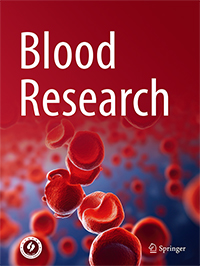Original Article
 Split Viewer
Split Viewer
Blood Res 2016; 51(1):
Published online March 31, 2016
https://doi.org/10.5045/br.2016.51.1.50
© The Korean Society of Hematology
Influence of genetic polymorphisms in the folate pathway on toxicity after high-dose methotrexate treatment in pediatric osteosarcoma
1Department of Pediatrics, Haeundae Paik Hospital, Inje University College of Medicine, Busan, Korea.
2Department of Pediatrics, Cancer Research Institute, Seoul National University Children's Hospital, Seoul National University College of Medicine, Seoul, Korea.
Correspondence to : Correspondence to Hee Young Shin, M.D., Ph.D. Department of Pediatrics, Cancer Research Institute, Seoul National University Children's Hospital, Seoul National University College of Medicine, 101 Daehak-ro, Jongno-gu, Seoul 03080, Korea. hyshin@snu.ac.kr
This is an Open Access article distributed under the terms of the Creative Commons Attribution Non-Commercial License (http://creativecommons.org/licenses/by-nc/4.0) which permits unrestricted non-commercial use, distribution, and reproduction in any medium, provided the original work is properly cited.
Background
Methotrexate (MTX), one of the main drugs used to treat osteosarcoma, is a representative folic acid antagonist. Polymorphisms of various enzymes involved in the metabolism of MTX could contribute to differences in response to MTX in pediatric osteosarcoma patients.
Methods
Blood and tissue samples were obtained from 37 pediatric osteosarcoma patients who were treated with high-dose MTX therapy. The following 4 single nucleotide polymorphisms (SNPs) were analyzed:
Results
Plasma MTX levels at 48 hours after high-dose MTX infusion were significantly associated with
Conclusion
This study suggests that plasma levels of MTX are associated with GI and renal toxicities after high-dose MTX therapy, and genetic polymorphisms that affect the metabolism of MTX may influence drug concentrations and development of significant side effects in pediatric patients treated with high-dose MTX.
Keywords Pediatric, Osteosarcoma, Methotrexate, Toxicity, Single nucleotide polymorphism
Article
Original Article
Blood Res 2016; 51(1): 50-57
Published online March 31, 2016 https://doi.org/10.5045/br.2016.51.1.50
Copyright © The Korean Society of Hematology.
Influence of genetic polymorphisms in the folate pathway on toxicity after high-dose methotrexate treatment in pediatric osteosarcoma
Jeong A Park1, and Hee Young Shin2*
1Department of Pediatrics, Haeundae Paik Hospital, Inje University College of Medicine, Busan, Korea.
2Department of Pediatrics, Cancer Research Institute, Seoul National University Children's Hospital, Seoul National University College of Medicine, Seoul, Korea.
Correspondence to:Correspondence to Hee Young Shin, M.D., Ph.D. Department of Pediatrics, Cancer Research Institute, Seoul National University Children's Hospital, Seoul National University College of Medicine, 101 Daehak-ro, Jongno-gu, Seoul 03080, Korea. hyshin@snu.ac.kr
This is an Open Access article distributed under the terms of the Creative Commons Attribution Non-Commercial License (http://creativecommons.org/licenses/by-nc/4.0) which permits unrestricted non-commercial use, distribution, and reproduction in any medium, provided the original work is properly cited.
Abstract
Background
Methotrexate (MTX), one of the main drugs used to treat osteosarcoma, is a representative folic acid antagonist. Polymorphisms of various enzymes involved in the metabolism of MTX could contribute to differences in response to MTX in pediatric osteosarcoma patients.
Methods
Blood and tissue samples were obtained from 37 pediatric osteosarcoma patients who were treated with high-dose MTX therapy. The following 4 single nucleotide polymorphisms (SNPs) were analyzed:
Results
Plasma MTX levels at 48 hours after high-dose MTX infusion were significantly associated with
Conclusion
This study suggests that plasma levels of MTX are associated with GI and renal toxicities after high-dose MTX therapy, and genetic polymorphisms that affect the metabolism of MTX may influence drug concentrations and development of significant side effects in pediatric patients treated with high-dose MTX.
Keywords: Pediatric, Osteosarcoma, Methotrexate, Toxicity, Single nucleotide polymorphism
Fig 1.

Plasma methotrexate levels at 48 hours after high-dose methotrexate infusion were significantly associated with the 80G>A variants of
Fig 2.

Plasma methotrexate levels at 48 (
-
Sequencing by synthesis (SBS) primer sequences for multiple amplification of methotrexate related genes.
-
Allele-specific primer extension (ASPE) primer sequences.
-
Characteristics of patients.
-
Genotype frequencies of the patients.
-
Associations between SNPs and plasma methotrexate concentrations at 48 hours after high-dose methotrexate therapy.
-
Analysis of MTX-induced toxicity and MTX concentrations at 48 and 72 hours after high-dose MTX therapy.
-
Analysis of SNPs and methotrexate-induced toxicity.

Article Tools
Stats or Metrics
Related articles in BR
-
Treatment outcome and prognostic factors in relapsed pediatric acute myeloid leukemia
Jung Hwan Lee, Hee Young Ju, Ju Kyung Hyun, So Jin Kim, Hee Won Cho, Jae Kyung Lee, Ji Won Lee, Ki Woong Sung, Keon Hee Yoo
Blood Res 2023; 58(4): 181-186 -
Favorable outcomes with durable chimerism after hematopoietic cell transplantation using busulfan and fludarabine-based reduced-intensity conditioning for pediatric patients with hemophagocytic lymphohistiocytosis
Jin Kyung Suh, Young Kwon Koh, Sung Han Kang, Hyery Kim, Eun Seok Choi, Kyung-Nam Koh, Ho Joon Im
Blood Res 2022; 57(2): 152-157 -
Outcomes of pediatric acute myeloid leukemia patients with FLT3-ITD mutations in the pre-FLT3 inhibitor era
Sujin Choi, Bo Kyung Kim, Hong Yul Ahn, Kyung Taek Hong, Jung Yoon Choi, Hee Young Shin, Hyoung Jin Kang
Blood Res 2020; 55(4): 217-224




 PDF
PDF Standard view
Standard view Export citation
Export citation Share
Share  Download
Download Previous Article
Previous Article



